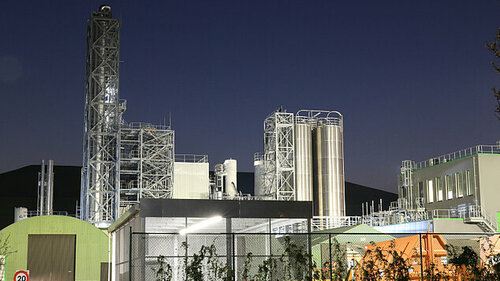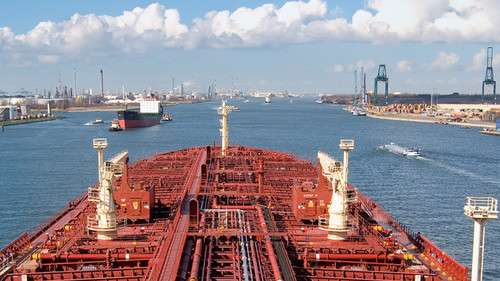Indaver Plastics2Chemicals recycling plant closes chain of crisp bags and yoghurt pots in Anwerpen, Belgium
Antwerp – The port of Antwerp has gained a new international landmark. Indaver Plastics2Chemicals is opening its first industrial plant for the advanced recycling of Polystyrene and Polyolefins—two families of plastics. Thanks to a self-developed technology, food packaging made from these materials will be recycled into new raw materials. Remarkably, the quality and purity of these raw materials are so high that producers can use them again in primary food packaging. Yogurt cups will remain yogurt cups—time and time again. And that is a European first.
Circular approach for all plastics
Plastics2Chemicals (P2C) will focus in the coming years specifically on the plastic types Polystyrene (PS)—think of yogurt cups, meat trays, and mushroom containers—and Polyolefins (PO)—such as chip bags and films. This choice is not surprising.
“A circular approach is a challenge for all plastics, but especially for PS and PO,” says Paul De Bruycker, CEO of Indaver. “The reason we chose PS and PO out of more than 100 tested feedstocks is that these materials are currently mechanically recycled into recyclate that is not of sufficient quality to be reused for food packaging, while part of it ends up in the incinerator. Through advanced recycling, P2C instead brings certified recyclate to the market that is equivalent to virgin plastics. This helps us avoid the extraction of new, raw materials.”
"By recycling plastics on an industrial scale into raw materials that are as high in quality and purity as their fossil-based counterparts, we avoid the extraction of new, raw materials. We can be proud that the first installation capable of achieving this is located in Belgium." - Paul De Bruycker, CEO of Indaver
European recycling targets become more achievable
The opening of the industrial plant comes just as many companies are searching for solutions to meet the EU's ambitious recycling targets, such as those outlined in the Packaging and Packaging Waste Directive and the Single-Use Plastics Directive. These regulations, for example, require that new packaging must contain more recycled content.
Erik Moerman, Director of Sales & Development at Indaver P2C, explains: "Long before strict targets brought the recycling challenges of PS and PO to the forefront, Indaver was already seeking solutions for these popular yet complex plastic families. As a pioneer in sustainable waste management, we launched Plastics2Chemicals in 2017 and collaborated with UGent, UAntwerpen, and KU Leuven to develop advanced recycling technology. Today, stakeholders across the entire chain are reaping the benefits of this work."
Indaver as a total partner
The brand-new recycling plant is at the heart of Plastics2Chemicals, but partners are also relieved of responsibilities in other parts of the chain.
Erik Moerman explains: "Together with our parent companies, Indaver and Katoen Natie, we can also handle the sorting and pre-treatment of PS and PO, as well as the sustainable processing of residues and even logistical services such as transport and storage. And all of this is done in our own facilities. This means that providers of end-of-life plastics and recyclate customers don’t need to change their operations or arrange any additional steps themselves."
The appeal of this model is demonstrated by the first agreements. On the provider side, P2C has already signed contracts with Citeo in France and Fost Plus in Belgium. For the purchase of recyclate, companies such as Trinseo, INEOS Styrolution, and TotalEnergies have committed.
"From sorting end-of-life plastics to the transport and storage of recyclate, we make it easier than ever for our partners to help close the loops of complex plastics." - Erik Moerman, Director of Sales & Development at Indaver P2C
Operational start at the end of 2024
After a two-year construction period, the construction of the recycling plant is fully completed. In the coming weeks, all installation components will be thoroughly tested to ensure safe operation. Following this, the operational start signal will sound, and the plant will process around 3 tons per hour or 26,000 tons per year.
“If everything goes smoothly, the first recycled basic chemicals will reach all our customers by the end of 2024,” says Stefan Opdenakker, Director of Operations at P2C and Site Manager of Indaver Antwerp. “In the first phase, we will recycle pre-treated PS (polystyrene) from food packaging such as yogurt cups and meat trays into pure styrene. That raw material will then be re-polymerized into PS by our partners in Flanders. After this initial phase, Indaver P2C will alternately recycle PS and PO (polyolefins) in separate campaigns in Antwerp. The recycling process of PO differs somewhat. First, we produce naphtha. Steam crackers then convert the naphtha into ethylene and propylene, which in turn are the building blocks of polyethylene and polypropylene.”
“The processes consume quite a bit of energy, but we have adjusted our technology in such a way that the primary energy source is electricity. Additionally, we are forming an energy cluster at the site, with solar and wind energy. This way, we will carry out advanced recycling to the maximum extent using green energy.”
“At the Indaver site in Antwerp, P2C benefits from synergies. This ensures a stable energy supply and also provides immediate solutions for the residues generated during the recycling process.” - Stefan Opdenakker, Director of Operations at P2C and Site Manager of Indaver Antwerp
Ambitiously facing the future
The goal is to scale up by 2028 and become the largest depolymerization facility in Europe. With a second line, capacity will be increased to 65,000 tons per year. Finally, Indaver P2C is also in talks to build advanced recycling plants at other strategic locations across Europe.
Categories
Investments
2022-01-01
€ 100 mln at Port Of Antwerp (BE)Latest news
Hycamite’s technology to decarbonize shipping awarded AiP by industry leader DNV
Kokkola Industrial Park →Hycamite’s proprietary Thermo-Catalytic Decomposition (TCD) technology offers a new approach to producing clean hydrogen by breaking down methane, the primary component of liquefied natural gas (LN...
Clariant catalysts will power the Ecoplanta: Europe's first waste-to-methanol plant
Chemmed Cluster Tarragona →Repsol is building Europe’s first plant to produce renewable methanol from urban waste The facility will use Enerkem gasification technology to produce 240 KTA of methanol Clariant will supply cata...
Lilly plans to build a new $3 billion facility to boost oral medicine manufacturing capacity in Europe for patients worldwide
Netherlands site will bring 500 manufacturing and 1,500 construction jobs while further strengthening Lilly's global supply chain
Ports of Duisburg and Rotterdam advance energy transition together
Port of Rotterdam →With this LoI, the two major European logistics hubs reinforce their goal of jointly developing sustainable transport corridors via waterways as well as future-oriented initiatives for the energy t...


